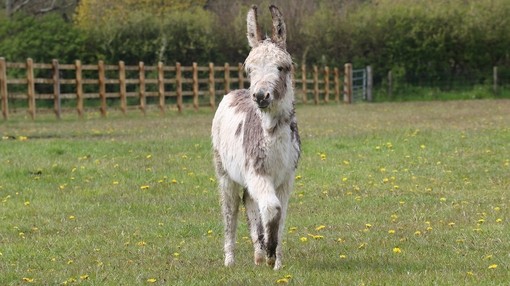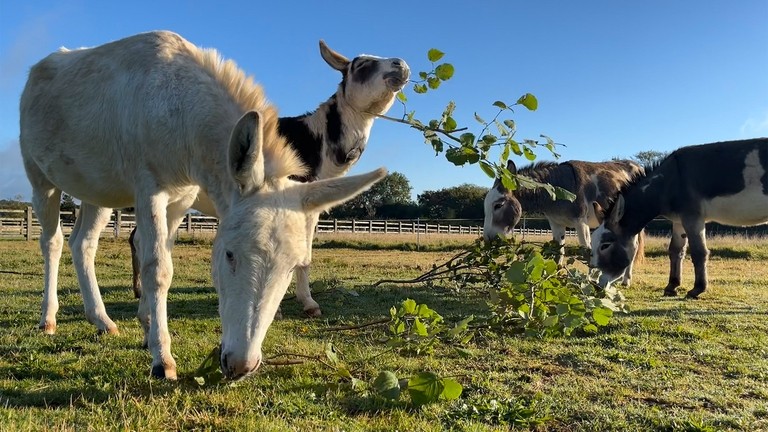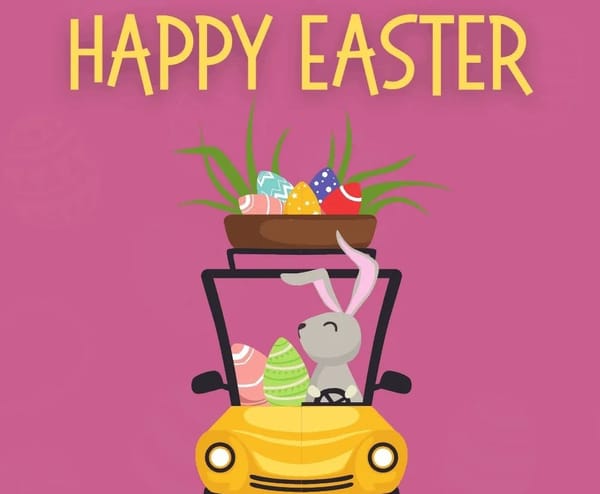Young Donkeys Thriving After Mums’ Historic Rescue

By Jill Dando News
A group of young donkeys born within a year of each other following their mums’ dramatic rescue from Wales are leading happy and healthy lives in Devon.
Rupert, Jonny, Pickle and Wizard were all born at our New Arrivals Unit after the rescue of mums Nelly, Primrose, Domino and Rabbit from a site in Wales.
The historic rescue – known as ‘Operation Dawn’ – is our most complex welfare undertaking to date.
Conducted in February 2021, The Donkey Sanctuary worked collaboratively with other animal welfare organisations and the police to rescue more than 70 donkeys who were all living in appalling conditions at a site in Carmarthenshire.
The four mums, who were involved in the rescue and brought to our New Arrivals Unit, were in dire need of veterinary intervention. The prolonged neglect they had endured had caused their dirty coats to become infested with lice.
Their hooves were also horrendously overgrown and mud and dung had encrusted into their fur. All four mares were also riddled with internal parasites.
Sara Blair-Salter, our New Arrivals Unit Manager, says: “Despite the neglect the mares had endured, they were still managing to grow foals, which was draining their energy and health even further.
“It just goes to show how stoic these four donkeys were – despite not having all of their needs met, they were fighting for not just their own survival, but their foals’ too.”
Welcomed to the world
A full year after they had arrived in Sidmouth, Primrose, Domino, Nelly and Rabbit had welcomed healthy foals.
Nelly gave birth to Rupert just weeks after the rescue had been carried out, and Primrose welcomed her foal Jonny three months later at the tail-end of May. Four months later, Domino gave birth to Pickle.
It took until the turn of the new year for the last foal to be born. Rabbit gave birth to Wizard in February 2022, marking the end of an extremely busy period for our New Arrivals team.
Sara says: “It was a very long year for our small team. There were six of us working around the clock to ensure the pregnant mares received what they needed.
“Our normal team would work in the day, mucking out and feeding the mares, and our ‘foal watch’ team sat up overnight, monitoring the mares on cameras we installed in the barns.
“There can be a lot of danger with foaling, especially if a mare gets into difficulty as it can put both her and her foal at risk. If there are any complications, we need to act immediately.
“Thankfully all four foals were delivered safely.”
However, the work didn’t stop once the foals had arrived. The grooms had to ensure each foal could get to their feet, pass meconium (first bowel movement) and begin confidently feeding from their mothers, as well as making sure that the mares had passed their placentas.

A ‘balancing act’
The length of time between each foal’s birth meant our grooms had to constantly be on hand to address each young donkey’s need. Using their expertise and wealth of donkey knowledge, they ensured all four foals received specialist care as soon as they were born.
“There are risks in every stage of the birth,” Sara adds. “It’s our job to mitigate that risk and ensure that the wellbeing of both mother and foal is of the highest priority.
“After the foals were born, the tasks take a different direction. It was a balancing act to ensure that we met all the foals and mares’ needs.
“When Wizard was born, Rupert was already a year old. These two foals had different short-term needs – Rupert was at the age where he needed other donkeys of a similar age to socialise and play with.
“Wizard on the other hand needed one-on-one time with his mum so he could build up that bond and gain all of the nutritional needs he required. At a few days old, he was fragile and vulnerable compared to Rupert, who had grown substantially and acclimatised to sanctuary life.”
With three of the foals born by September 2021, the grooms faced a five-month wait for Wizard to be born. During this time, mum Rabbit was constantly monitored and examined to give her foal the best chance of being born safely.
“This whole journey was an emotional rollercoaster for us,” Sara recalls. “We went to bed with the donkeys on our minds and at times woke up in the night thinking about them.
“We were on high alert for months at a time. We could only begin to relax when we knew all four foals had been delivered safely.”
Health scares
Despite recovering well from their ordeal in Wales, one of the mares experienced a new and pressing health scare that was only discovered when her foal was in hospital.
Eight weeks after his birth, our grooms noticed Pickle had loose bowel movements and was acting dull – a concerning trait that indicated a deeper problem.
Being so young, Pickle was very vulnerable and was immediately admitted to our donkey hospital for expert veterinary care with his mum by his side. However, it was during Pickle’s stay that our vets discovered a new veterinary issue, this time concerning Domino.
An invasive tumour called a sarcoid had developed to the side of her udder, which the vets monitored closely while Pickle was treated.
Veterinary Surgeon Jamie Forrest says: “Pickle became dehydrated through his illness, which could have had serious implications due to his young age.
“We treated Pickle by administering intravenous fluids and antibiotics, which he responded well to.
“Pickle still had a very strong bond with his mum and needed to be with her at all times. As such, he was still feeding from her during his treatment.
“We had to make a decision about feeding Pickle – if we didn’t allow him to suckle from Domino, we would have to take him away and bottle feed him. This would have been very distressing for both donkeys.
“Therefore, we felt it was in Pickle and Domino’s best interest that they remain together throughout their stay.”
Our vets also had to wait until Pickle was old enough to wean before they could treat Domino’s sarcoid. This meant waiting for her milk to reduce and her udder to return to a normal size to help the success of the surgery.
“Normally, intervening early gives us a better chance of treating sarcoids,” Jamie says. “This was an unusual case that required us to balance Pickle’s needs for as long as possible without putting Domino at risk.”
Pickle and Domino remained at our hospital for just over a week before returning to Sidmouth. Domino was operated on eight weeks later and the sarcoid was successfully removed.
“Without the expertise and quick actions of our Veterinary team, I don’t think Pickle would have survived,” Sara says.
“Intensive care comes at a cost so we are hugely grateful to our supporters who ensure that donkeys like Pickle and Domino receive the very best veterinary care.”
Domino is regularly checked for sarcoids by her grooms and given a full examination by our Veterinary team every six months.
Thankfully, she has remained clear of sarcoids throughout the last two years and is a happy and healthy member of her herd.
Donkey Assisted Activities
Today, all four youngsters are part of our Donkey Assisted Activities (DAA) service operating at our Sidmouth sanctuary.
They have been part of our DAA setup for seven months, with our team giving them the freedom to choose if they want to interact in the daily sessions held for its users.
Equine Coordinator Louise Blair says: “Rupert, Jonny, Pickle and Wizard are still young donkeys so we are taking every day slowly to help build their confidence and resilience.
“All donkeys have individual characters, so it is important we start to recognise their regular behaviours and work within their comfort zones while they are still in training.
“There is never any pressure on them to engage, but the fact they have shown they do want to interact is very encouraging and we look forward to working with them more as their training develops.”

A recent visit by a local volunteering group has highlighted the donkeys’ potential to seamlessly integrate into the scheme going forward.
“Pickle, Rupert and Wizard approached the volunteers actively seeking out interaction,” Louise says.
“They were very interested in the volunteers, and at one point Pickle put his head on one of the volunteer’s shoulders and rested comfortably for a while.
“Rupert also showed a big interest in one of the ladies who was trying to take photos. He pressed up against her and pushed his nose towards her phone, prompting plenty of laughter.
“These special interactions really brightened the group’s day and made their experience of DAA truly memorable.”
The four donkeys will remain with DAA for the foreseeable future, and Louise says she would like to see them supporting all of the different programmes the scheme offers.
“At the moment, we have kept them within the wellbeing and interaction sessions,” she adds.
“Moving forward, we would like them to participate in our Donkey Management Programme, which aims to educate people on donkey welfare and wellbeing through a physical approach, and our Donkey Facilitated Learning Programme, which involves coaching-based interactions in the presence of donkeys to help clients develop key life skills.
“They have become firm favourites in the herd and we are very lucky to have them.”
HELP CHANGE THE STORIES OF MORE VULNERABLE FOALS
By donating, you can protect foals like Rupert, Jonny, Pickle and Wizard by helping them have the best possible start to life.





